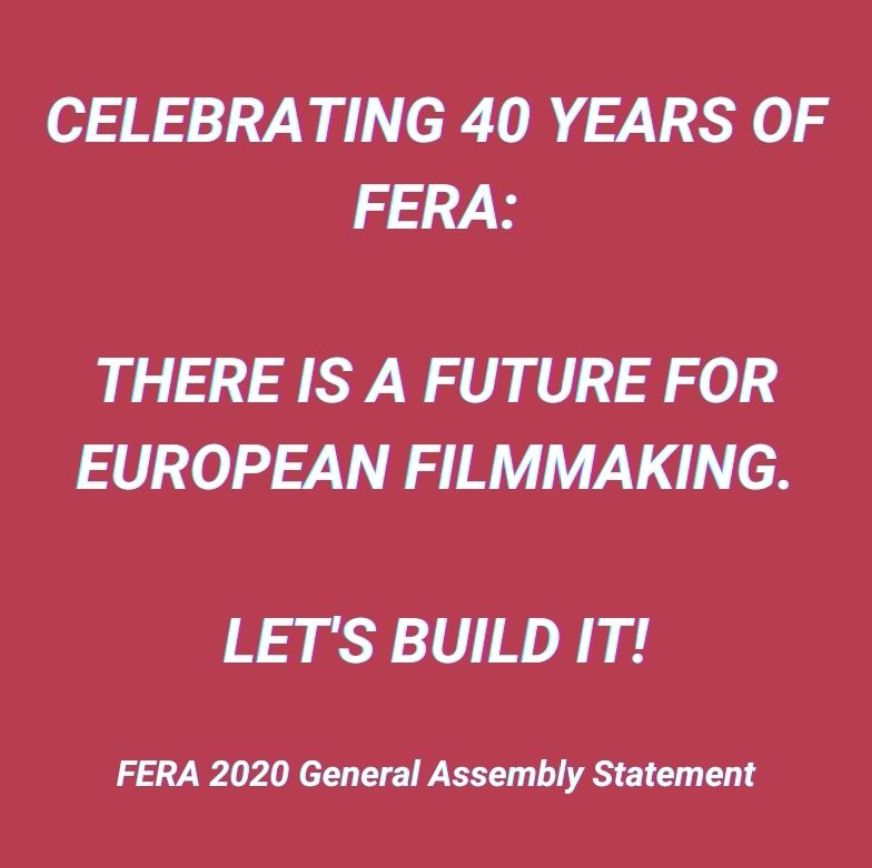
Events, FERA Speaks, FERA Statement, News
40 years of FERA: There is a Future for European Filmmaking. Let’s build it!

Celebrating FERA’s 40th anniversary under the shadow of COVID-19 is a unique moment in our sector’s history for our European Filmmakers’ community to come together – on a digital platform – to reflect on the ongoing sea changes in our art, our profession, our industry.
Liv Ullmann puts it in the simplest terms: “We are storytellers”. As both authors and skilled technicians responsible for overseeing every facet of its realisation, we bring a singular vision to the film throughout the production process. Making captivating stories for the screen, in all their diverse subjects and forms, is a craft that requires a very broad skillset and a good deal of determination – to deliver your vision, you have to be proud to be stubborn.
Today, the COVID-19 crisis presents an immediate and serious threat to the vast majority of European filmmakers who risk losing creative and artistic freedom in addition to looming unemployment and poverty, and we once more urge political and industrial decision-makers to take urgent measures to mitigate the devastating impact of the ongoing crisis on self-employed and freelance creators.
While COVID-19 is not the sole cause of all our struggles, it certainly is an accelerator which makes our profession and our industry underlying issues painfully immediate. The ongoing second wave confirms it: this pandemic is the end of the world we know and must be a wake-up call beyond the immediate danger and hard consequences we will have to face.
In the past, European filmmakers often appeared as god-like creator figures. Autocratic auteurs. Today, directing stories for the screen in a wide range of formats puts us in a more complicated position, as our work and creative imprint is sometimes barely recognized, with a growing misconception that directors can be merely shot collectors. Perhaps we have been co-authors of our own disappearance: very often directors are lone guns, one man-bands working in isolation amidst harsh competition.
But as we are confronted with bigger and bigger production and distribution systems, we need to come together to become an instrumental part of this change – to rethink how to assert our role as storytellers in new contexts and new ways, to rebuild meaningful creative collaborations with writers and producers when they seem to no longer be the norm.
There are new spaces to tell our stories today, and these new horizons are thrilling: there is a hunger for stories, international audiences’ taste has developed with online access and there is a broader willingness to see stories of universal scope from all corners of the world.
But we lack a strong, curated online offer of European cinema and audiovisual works, and global online distribution of audiovisual content has sidelined European audiovisual creation. We are disconnected from our audience – younger audiences, worldwide audiences and now even from our remaining local audiences, with the exponential rise of global streamers in Europe while our infrastructure of cinema theatres, independent distributors and producers is hit hard by the ongoing crisis.
The archetypes of worldwide cinema in the future will likely not be European – but connecting with the audience through screens big and small will always be a matter of vehemence of vision.
And visual storytelling is not about pre-empting the audience’s taste by algorithmic calculations of averaged past shows or global reach – it’s about human connection. About creating intimate, personal sensation and a unique experience for the viewer. That’s our craft, our art as directors – and fighting for our creative space means fighting to reconnect with our audiences. We need to take the digital blindfold off: beyond negotiating a fair share of the economic success of our work, transparency of data is essential for us to get the vital sense of the reaction of the audience to our work so we can hone our storytelling craft.
We will adapt to continue to be storytellers by re-building our creative space in TV and online as well as in new forms of cinema. If we do not, our diverse artistic and creative voices will go silent as part of Europe becomes a cheap production house for global audiovisual entertainment, while the rest is simply excluded from it.
Local, regional and diverse audiovisual creation is our strength: in Europe, it was made possible by solidarity and co-productions, allowing for smaller production countries to find their own voice. Keeping our culture and history as our creative and artistic heartbeat, we must be bold, rogue, self-reliant and more intelligent in the way we apply our resources – not merely based on a COVID-proof formula but more deeply, more sustainably. Reliance on traditional working practices is no longer an option if we don’t want to become extinct.
The only way forward is through. That is our vision for our future – not “based on a true story”, but delivering truth – viscerally honest European filmmakers: united, sharp, courageous and bold.
Bill Anderson, FERA board member
Renaud Bertrand
Isabel Coixet, FERA Ambassador, Europa Distribution President
Klemen Dvornik, FERA Chair
James Hawes
Werner Herzog
Agnieszka Holland, FERA Honorary President
Hrvoje Hribar, FERA board member
Teona Strugar Mitevska
Liv Ullmann, FERA Honorary President from 2003 to 2008
Birgitte Stærmose, FERA board member
István Szabó, FERA Honorary President from 2008 to 2013
>> FERA’s 40-year Anniversary General Assembly online series took place from October 6 to October 20, 2020. Public sessions are available to watch online on our website.
